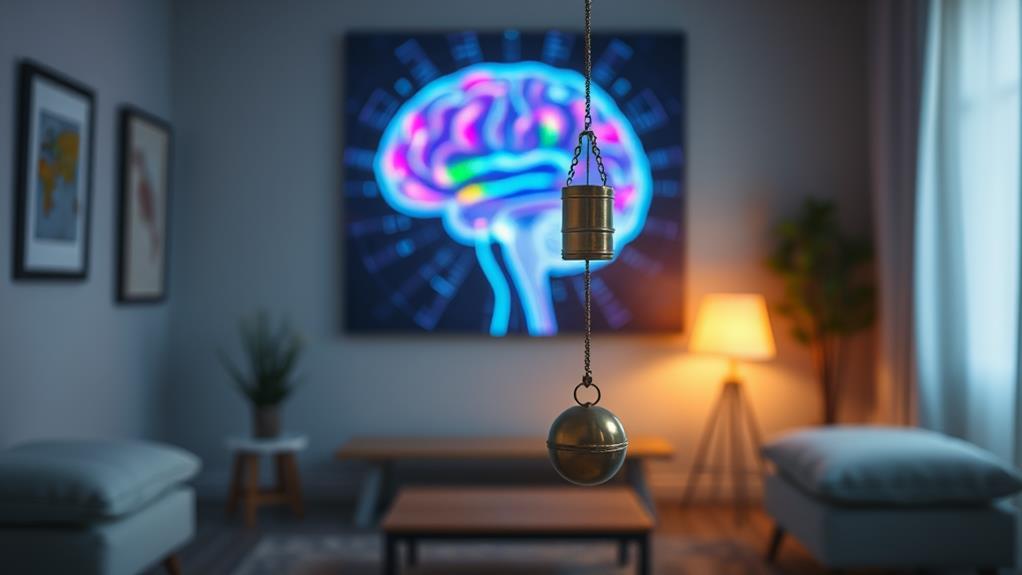
Memory reconsolidation possible with hypnosis, a process that updates existing memories with new information or contexts, can indeed be facilitated through hypnosis. This psychological technique is particularly effective in addressing emotional and traumatic memories by engaging the subconscious mind in a controlled therapeutic setting.
Through hypnosis, practitioners can diminish the emotional intensity associated with such memories, paving the way for decreased anxiety, fear, and undesirable behaviors linked to those memories. A variety of case studies highlight the success of hypnosis in promoting psychological healing. Further insights into hypnotherapeutic techniques could increasingly enhance their precision and effectiveness in clinical practice.
Key Takeaways
- Hypnosis can activate memory reconsolidation by accessing and updating emotional memories.
- It allows for emotional healing by altering memory-related emotional intensities.
- Hypnotherapy integrates with psychological theories to enhance memory reprocessing.
- Personalized hypnotherapy sessions target specific memory issues, improving outcomes.
- Collaborative research supports the efficacy of hypnosis in memory reconsolidation.
Understanding Memory Reconsolidation
Memory reconsolidation, a crucial process within the field of neuroscience, involves the reactivation and subsequent updating of pre-existing memories. This phenomenon is particularly significant when dealing with emotional and traumatic memories, which can often disrupt an individual’s psychological well-being. Neuroscience research, especially studies like those conducted by Lane, Ryan, Nadel, & Greenberg in 2015, has underscored the potential of memory reconsolidation to modify the emotional intensity and narrative context of memories, thereby altering their impact on an individual’s life.
The process of memory reconsolidation is triggered when a memory is recalled and becomes labile or malleable again. This period of lability provides an opportunity for the emotional details of the memory to be reshaped before it re-stabilizes in the brain. Techniques such as those used in hypnosis can facilitate this process by inducing a hypnotic trance, where individuals can access deep-seated memories under the guidance of a trained therapist.
In this controlled environment, the recollection of traumatic memories can be managed more safely, minimizing the risk of re-traumatization.
The strategic use of hypnosis in memory reconsolidation leverages this window of memory malleability to integrate new, less distressing perspectives into the recalled memory. The aim is not to erase memories but to diminish their distressing impact, allowing individuals to rewrite their personal narratives in a more empowered and emotionally balanced way. Therefore, hypnosis and memory work, especially in the context of traumatic experiences, offer profound implications for therapeutic interventions, pushing the boundaries of how we comprehend and intervene in the mechanisms of human memory.
Hypnosis and Emotional Healing

Building on the understanding of memory reconsolidation, hypnosis emerges as a powerful tool in the domain of emotional healing. By leveraging the brain’s innate ability to reprocess and alter memories, certified clinical hypnotherapists can guide individuals through a transformative journey to address and mitigate the emotional impact of past experiences. This technical approach enables the reconfiguration of distressing memories, potentially diminishing their disruptive influence on mental health.
Hypnosis facilitates a controlled environment where individuals can safely explore emotional disturbances. This process not only accesses deep-seated memories but also allows for their reevaluation and reconsolidation in a manner that can reduce their traumatic impact. The essence of this therapeutic approach lies in its capacity to rewrite the emotional narratives associated with memories, thereby fostering a healing process that can lead to significant improvements in emotional well-being.
The efficacy of hypnosis in emotional healing is supported by its ability to engage the subconscious mind in a focused and profound manner. Through this engagement, memories that are often inaccessible during normal conscious states can be revisited and reprocessed. This reconsolidation process is critical as it transforms how memories are stored and recalled, which consequently influences emotional responses.
For those seeking to explore this avenue of mental health improvement, it is advisable to consult with certified clinical hypnotherapists who specialize in memory reconsolidation. These professionals can provide the necessary support and guidance through tailored hypnotherapy sessions. For more detailed information or to schedule a consultation, please call us at our dedicated mental health support line.
Techniques in Hypnotherapeutic Reconsolidation

In the field of clinical hypnotherapy, techniques for hypnotherapeutic reconsolidation are fundamental in transforming how individuals process and react to emotional memories. Centered on the foundational principle that emotional memories can be accessed, assessed, and altered through hypnosis, these techniques offer a methodological approach to emotional healing. The primary objective is to modify the emotional intensity associated with a memory, thereby altering its impact on the individual’s psychological state.
Hypnotherapeutic reconsolidation leverages our understanding of how memories are stored in the subconscious mind. During hypnosis, therapists guide individuals to a state of heightened suggestibility and receptivity, where deep-seated emotional memories can be safely revisited. This process involves the careful induction of a hypnotic state, followed by techniques designed to access specific memories and the emotions tethered to them.
Once a targeted memory is accessed, the next step involves the reprocessing phase, where the individual, aided by the therapist, integrates new, more adaptive information into the memory. This is vital for updating the memory’s emotional content and reducing its distressing impact. Techniques such as guided visualization, narrative restructuring, and the use of positive affirmations are employed to reframe and neutralize negative emotional charges.
The ultimate goal of hypnotherapeutic reconsolidation is to foster more adaptive responses to past experiences. By altering how memories are emotionally charged, individuals can achieve significant shifts in their emotional responses and behavioral patterns. This transformation allows for a more empowered and emotionally resilient state, contributing profoundly to overall mental health and well-being.
Case Studies and Success Stories

Reflecting on the methodologies employed in hypnotherapeutic reconsolidation, a series of case studies and documented success stories offer concrete evidence of the efficacy of these techniques. One notable case involved a client suffering from severe anxiety due to traumatic childhood events. Through systematic hypnotherapy sessions focusing on memory reconsolidation, the client exhibited a significant reduction in anxiety symptoms, demonstrating the profound impact of accessing and restructuring emotional memories.
Further analysis reveals consistent success in treating phobias and trauma-related memories. For instance, individuals with long-standing phobias underwent a sequence of hypnotherapeutic interventions that targeted the neural basis of fear memory. These interventions facilitated the dissociation of fear responses from the memory triggers, resulting in diminished phobic reactions and sustained behavioral changes. Such outcomes underscore the potential of hypnotherapy to alter maladaptive emotional responses through targeted memory reconsolidation.
Moreover, clients with histories of addiction have reported lasting changes in behavior and emotional responses after undergoing hypnotherapy. These transformations are often attributed to the reprocessing of compulsive memory patterns, which are effectively rewritten to foster healthier coping mechanisms and resilience against relapse. The success stories highlight not only the clinical relevance of these techniques but also their contribution to enhancing clients’ self-esteem and overall emotional well-being.
Future Directions in Hypnotherapy

Advancements in hypnotherapy are paving the way for breakthroughs in the field of memory reconsolidation, signaling a promising horizon for therapeutic practices. As research deepens, the potential for hypnosis to facilitate profound emotional healing through memory reconsolidation is becoming increasingly evident. This advancement not only broadens the scope of therapeutic interventions but also enhances their effectiveness, leading to more sustained behavioral changes and improved psychological well-being.
The future directions of hypnotherapy are characterized by several innovative approaches and methodologies:
- Integration of Advanced Psychological Theories: Bridging concepts from Depth Psychology, Positive Psychology, and Neuro-Linguistic Programming with clinical hypnotherapy to create a more holistic approach to memory reconsolidation.
- Personalization of Therapeutic Techniques: Developing tailored hypnotherapy sessions that specifically address individual emotional issues, enabling more precise and effective interventions.
- Enhancement of Therapeutic Tools: Utilizing cutting-edge technology such as biofeedback and virtual reality to augment the hypnotherapy process, making it more immersive and impactful.
- Collaborative Research Initiatives: Engaging in multidisciplinary studies with neuroscientists, psychologists, and other medical professionals to refine and validate hypnotherapeutic techniques for memory reconsolidation.
These future directions underscore a commitment to not only advancing hypnotherapy as a field but also to understanding the complexities of human memory and emotion. By focusing on these areas, hypnotherapy is set to revolutionize the way emotional and psychological disorders are treated, paving the way for a new era of therapeutic possibilities.
Frequently Asked Questions
Does Hypnosis Work for Memory Retrieval?
Hypnosis serves as a potent tool for memory retrieval, leveraging its capacity to enhance focus and relaxation, thereby facilitating access to deep-seated memories.
Studies indicate that while effective, the fidelity of recollections retrieved through hypnosis can vary, sometimes leading to embellished or reconstructed memories.
While hypnosis can open up past experiences, it is essential to handle the retrieved information with discernment, acknowledging the potential for memory distortions inherent in the process.
What Are Some Memory Reconsolidation Techniques?
Memory reconsolidation techniques involve several psychological interventions aimed at altering the emotional impact of existing memories. These methods include targeted memory reactivation, which prompts recall of the memory within a new or modified context, often using sensory cues.
Behavioral interventions, such as exposure therapy, and cognitive techniques, like schema therapy, also support the integration of new, corrective information into the recalled memory, facilitating emotional healing and resilience in individuals.
Can Hypnosis Increase False Memories?
Hypnosis, as a therapeutic intervention, can inadvertently lead to the creation of false memories. This phenomenon occurs due to heightened suggestibility where individuals might misinterpret suggested ideas as genuine memories. Research indicates that while hypnosis aims to facilitate healing and insight, the process can sometimes distort memory accuracy, embedding events that did not occur.
Consequently, practitioners must exercise caution to minimize the risk of false memory production during hypnotherapy sessions.
What Is Hypnotic Memory?
Hypnotic memory refers to the therapeutic use of hypnosis to access and potentially modify memories. This approach is utilized within clinical settings to help individuals recall and reprocess past experiences, often addressing deep-seated traumas and emotional disturbances. By facilitating a controlled environment, hypnosis enables a focused exploration of memory, which can lead to insights and emotional healing, making it a valuable tool in psychological therapy and mental health treatment.
Conclusion
To sum up, the growing domain of hypnotherapy, especially in conjunction with memory reconsolidation, heralds a new chapter in psychological healing. This groundbreaking approach not only revises the distressing narratives ingrained within the human psyche but also reignites the radiant capacity for emotional freedom and strength. As the boundaries of hypnotherapeutic applications widen, they vow to reveal unparalleled routes for the renewal and rejuvenation of mental well-being, providing a guiding light for those entangled by the shadows of previous hardships.

Take the Next Step, Make An Appointment
Do not be afraid to reach out to me, Mark , to assist you in any issues you might have. Need a good listener or someone to confidentially talk too? . Life Coaching is 45 minute session, once a week.
Self-Hypnosis is taught in one session, individual sessions or in a group, and lasts a lifetime. Most Hypnotherapy sessions including Age regression last 2 hours and EFT Sessions are usually handled with a one hour session
To make an appointment, first listen to the Pre-talk and fill out the Complementary Healthcare Provider Disclosure. The use the Contact Form to request an appointment with, Mark, The Bohol Hypnosis Expert.
Self-help downloads are available to help you with specific problems. The self-hypnosis program to teach you how to self-hypnotize yourself is available here.





